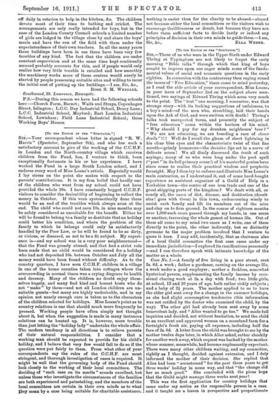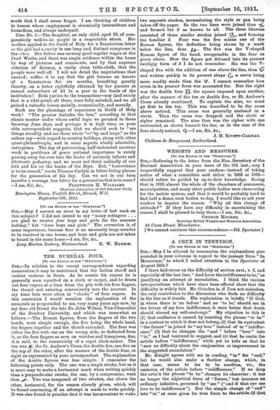[TO THE EDITOR or THE "SPECTATOR. " ] Sin,—Those of us who
were in the Upper Sixth under Edward Thring at Uppingham are not likely to forget the early .morning "Bible talks" through which that king of boys sought to impress upon our eager minds some of the funda- mental values of social and economic questions in the early eighties. In connexion with the controversy then raging round the issues of "Free Education," there came to mind yesterday, as I read the able article of your correspondent, Miss Loane. in your issue of September 2nd on the subject above men- tioned, two sayings of Edward Thring which seem very much to the point. The " text " one morning, I remember, was that strange story—with its lurking suggestions of unfairness, to a boy's mind—of the men who, stumbling, laid their hands upon the Ark of God, and were smitten with death ! Thring's talks took unexpected turns, and presently the subject of " free education " came within the horizon of his mind. " Why should I pay for my drunken neighbours' beer ? " " We are not educating, we are breeding a, race of clever devils" !!! Well do I recall the gleam of sheet lightning in his clear blue eyes and the characteristic twist of that fine mouth—grimly humorous—the decisive lips set in a curve of delicate scorn ! We all dimly discerned the truth of such sayings ; many of us who were long under the poet spell (" poet " in its full primary sense !) of his masterful genius have since come to realize their practical wisdom and prophetio foresight. May I then try to enforce and illustrate Miss Loam's main contention, as I understand it, out of some hard-bought experience as assistant organizer of a Guild of Help in a Yorkshire town—the centre of our iron trade and one of the great shipping ports of the kingdom P We dealt with all, or nearly all, the cases of dirt, disease, and destitution (deceit alas! goes with them) in this town, endeavouring wisely to assist each family and lift its members out of the mire and clay on to firm ground. In the course of eighteen months over 1,000 such cases passed through my bands, in one sense or another, traversing the whole gamut of human ills. Out of them all come to my mind two cases as I write, one of them directly to the point, the other indirectly, but so distinctly germane to the major problem involved that I venture to quote it here. I may add, incidentally, that as chairman also of a local Guild committee the first case came under my immediate jurisdiction—I explored its ramifications personally —and I can therefore speak with intimate knowledge of the matter as a whole.
Case No. 1.—A family of five living in a poor street, rent 5s. 6d. a week ; father a gardener, earning on the average 25s. a week under a good employer ; mother a feckless, somewhat hysterical person, supplementing the family income by occa- sional chilling work at 2s. a day with food; two little girls, at school, 13 and 10 years of age, both rather sickly subjects ; and a baby of 2i years. The mother applied to us to have the elder girl sent away for a change in the summer holidays, as she had slight consumptive tendencies (this information was not ratified by the doctor who examined the child, by the way). The other girl had already been sent away by some benevolent lady, and "Alice wanted to go too." We made full inquiries and decided, not without hesitation, to send the child to an excellent and approved woman on a moorland farm for a fortnight's fresh air, paying all expenses, including half the fare of 2s. 6d. A letter from the child was brought to me by the mother twelve days later, in which Alice asked, rather cheekily for another week away, which request was backed by the mother whose manner, meanwhile, had become unpleasantly expectant. There were many other children waiting, and my committee, rightly as I thought, decided against extension, and I duly informed the mother of their decision. She replied that Alice had been " accustomed " for the past three years to get three weeks' holiday in some way, and that "the change did her so much good." She concluded with the pious hope that the Guild might manage three weeks next year!
This was the first application for country holidays that came under my notice as the responsible person in a case, and it taught me a lesson in perspective and proportionate needs that I shall never forget. I am thinking of children in homes where employment is chronically intermittent and hazardous, and always underpaid.
Case No. 2.—The daughter, an only child, aged 18, of com- paratively well-to-do people in a respectable street. Her mother applied to the Guild of Help for a Sanatorium letter as the girl had a cavity in one lung and distinct symptoms in the other. Her father was earning good regular wages at the Steel Works, and there was ample evidence within the home by way of pictures and ornaments, and by that supreme criterion of decency, a really clean table-cloth, that the people were well off. I will not detail the negotiations that ensued ; suffice it to say that the girl became an inmate of a Sanatorium for six months, benefiting greatly thereby, on a letter rightfully obtained by her parents as annual subscribers of £1 Is. a year to the funds of the institution ! Both rarties to the transaction—nay (and surely that is a vital point) all three, were fully satisfied, and we all gained a valuable lesson socially, economically, and morally.
Such are the gleanings of experience in Guild of Help work ! " The greater includes the less," according to that classic mentor under whose awful logic we groaned in those far-away June days, and perhaps it is high time, as your able correspondent suggests, that we should seek to " see things steadily and see them whole "—" by and large," as the sailors say—with regard to country holidays, along with other quasi-philanthropic, and in some aspects wholly admirable, enterprises. The day of patronizing, half-instructed amateur work in problems of grave national importance is surely passing away for ever into the limbo of untimely infants and dilettante pedantry, and we must not think unkindly of our kith and kin on the banks of the Styx. But " benevolence is twice cursed," wrote Thomas Carlyle in bitter-biting phrase for the generation of his day. Can we not in our turn inscribe a message less bitter for a generation that is to come ?
—I am, Sir, &c., FLEETWOOD H. WILLIAMS
(National Association of Old Scholars' Club).
Donington House, Norfolk Street, Strand, N.C. September 6th, 1911.











































 Previous page
Previous page